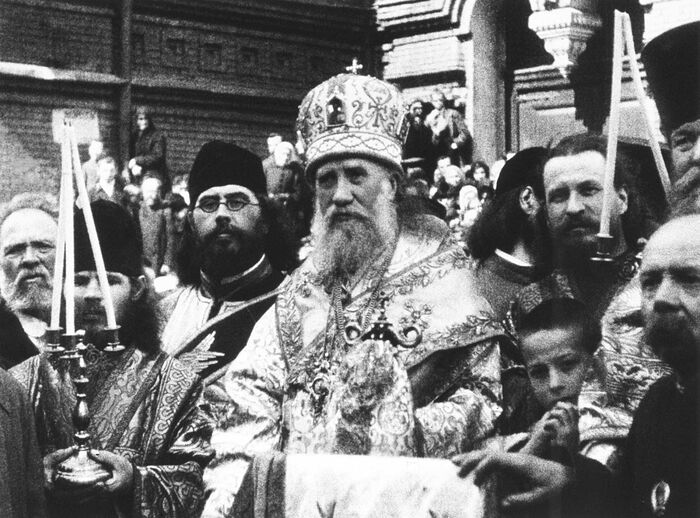“I WAS THE SMALLEST AMONG MY BRETHREN.” PATRIARCH TIKHON’S HOMILY AT HIS ENTHRONEMENT
DELIVERED IN THE DORMITION CATHEDRAL OF THE MOSCOW KREMLIN
 Photo: stsl.ru
Photo: stsl.ru
By the dispensation of divine Providence, my ascent to this Patriarchal Cathedral of the Most Pure Mother of God coincides with the all-holy feast of the entrance of the Most Holy Theotokos into the Temple. “The high priest Zachariah wrought a strange and marvelous thing when he led the Maiden into innermost tabernacle, the Holy of Holies, which he did according to mysterious divine instruction” (Menaion, November 21). Wondrous to everyone is also—according to God’s dispensation—my present entrance into the Patriarchal throne, after it has stood empty for 200 years.1 Many men, strong in word and deed, who obtained a good report through faith, men of whom the whole world was not worthy, nevertheless did not receive the fulfillment of their yearning for the restoration of Patriarchy in Rus’, did not enter into the Lord’s rest, the promised land, to whence their holy thoughts were directed; for God provided a better thing for us (cf. Heb. 11:39–40).
But may we not fall into pride because of this, brothers. One thinker who greeted my unworthiness wrote: “Perhaps the Patriarchy, which people much stronger and more worthy than us were unable to see but is now granted to us, will serve as God’s mercy shown to us precisely in our infirmity, our spiritual poverty.” As for myself, the gift of Patriarchy grants me to feel how much is demanded of me and how much I lack. And from this realization, my soul today is seized with trembling.
Like unto David, I was the smallest among my brethren—excellent and great—but it was the Lord’s pleasure to choose me (cf.: Ps. 151). Who am I, my Lord, that thou hast loved me hitherto? Thou knowest thy servant, O Lord, my Lord. And now begin and bless thy servant (cf. 2 Kings 7:18, 20, 29 LXX). Thy servant amidst Thy people, so great in number—give me a wise heart to hear and judge Thy people on the path of salvation (cf. 3 Kings: 3:8–9 LXX). Warm my heart with love for the children of God’s Church and enlarge it, that they might be easily contained in me. For archpastoral service is first of all a service of love. When a sheep is lost, the archpastor takes it upon his shoulders.

True, the Patriarchate is being restored in Rus’ during terrible times, amidst storms that tear mountains and crush rocks, amidst fire and death-dealing gunshots. Most likely it [the Patriarchate] itself will be forced more than once to take measures of excommunication to bring the disobedient to reason and to restore ecclesiastical order. But as in ancient times the Lord appeared to prophet Elias not in the wind, not in the storm, not in the earthquake, and not in the fire, but in coolness and voice of a gentle breeze—so also at our fainthearted reproach: “O Lord, the sons of Russia have abandoned Thy commandments, destroyed Thine altars, shot at the churches and holy shrines of the Kremlin, and beaten Thy priests”—we can hear the still, small voice of God: “There are yet seven thousand men, who have not bowed their knees to Baal, nor betrayed the true God” (cf. 3 Kings: 19:10–12, 14, 18).
And the Lord as if says to me: Go and search out those for whose sake the Russian land yet stands and holds. But neither abandon the lost sheep condemned to destruction, to the slaughter—truly pitiful sheep. Shepherd them, and to this end take up this staff, the staff of good will (cf. Zach. 11:7). With it seek those who are lost, return those who were driven away, bind the broken, strengthen the sick; but destroy the fat and the strong, and feed them with judgment (cf. Ez. 34:16).
In this may the Chief Shepherd Himself help me, through the prayers and intercessions of the Most Holy Theotokos and the holy hierarchs of Moscow. May God bless you all with His grace. Amen.
November 21, 1917
11/18/2021
1 The Russian Patriarchate was abolished by Tsar Peter II (the Great), and for 200 years the Church was governed by a Holy Synod, headed by a secular person appointed by the Tsar. These years brought a good deal of secularization to the Russian Orthodox Church. The chief hierarch during that period was the Metropolitan of Moscow.—OC.
No hay comentarios:
Publicar un comentario